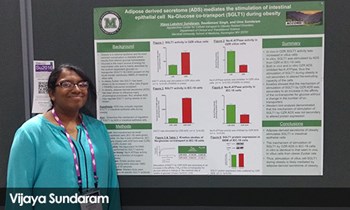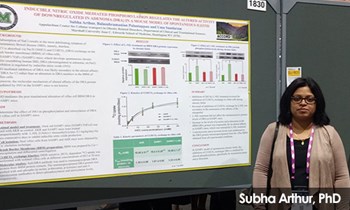Marshall researchers showcase work at Digestive Disease Week
BLOG / By Dr. Uma Sundaram


Digestive Disease Week®, or DDW, is the world's largest gathering of physicians, researchers and industry in the fields of gastroenterology, hepatology, endoscopy and gastrointestinal surgery. It’s really the pinnacle event in our field and offers a unique opportunity to showcase our research to an international audience.
Abstracts submitted for this meeting are notoriously difficult to get accepted for presentation. At this year’s meeting in San Diego, we had a record eight abstracts accepted for presentation from the Marshall University Joan C. Edwards School of Medicine—the most presentations from Marshall ever accepted to DDW.
This milestone comes as a direct result of the increased emphasis on research both at the School of Medicine and Marshall University in recent years. We’ve assembled an impressive team of biomedical and clinical and translational scientists at all levels who are doing truly extraordinary work in areas of research that most impact the health and well-being of West Virginians and those throughout the Appalachian region.
What is even more remarkable is the transformational shift we’re seeing in research—from faculty and students alike—at the School of Medicine. The research presented by Marshall at DDW was carried out and presented by BS/MD and graduate students, post-doctoral fellows and junior faculty. Their research focused on two of the most common digestive conditions in West Virginia—obesity and inflammatory bowel disease (IBD)—and how intestinal nutrient absorption may be affected by these conditions in hopes of discovering novel treatments.
- Subha Arthur, PhD, assistant professor of clinical and translational science, on “inducible nitric oxide mediated phosphorylation regulates the altered activity of downregulated in adenoma (DRA) in a mouse model of spontaneous ileitis” and the “Effect of farnesoid x receptor activation on bile acid absorption associated proteins in intestinal epithelial cells”
- Molly Butts, PhD, 2019 PhD graduate in Biomedical Research, on “Moderate ethanol consumption inhibits villus cell brush border membrane NA-dependent nutrient absorption in the small intestine”
- Jennifer Haynes, PhD, research assistant professor of clinical and translational science, on “Establishment of long-term normal human intestinal epithelial organoid cultures to study the regulation of intestinal nutrient and electrolyte transporters”
- Niraj Nepal, PhD, 2019 PhD graduate in Biomedical Research, on “Mechanism of inhibition of villus cell Na/K-ATPase by PGE2 in the chronically inflamed intestine”
- Balasubramanian Palaniappan, PhD, instructor of clinical and translational science, on “Unique regulation of intestinal epithelial cell NA-glucose CO-transporter SGLT1 by constitutive nitric oxide”
- Soudamani Singh, PhD, assistant professor of clinical and translational science, on “Regulation of NA-glutamine CO-transport B0AT1 in villus cells during obesity”
- Vijaya Sundaram, BS/MD student, on “Adipose-derived secretome (ads) mediates the stimulation of intestinal epithelial cell NA-glucose CO-transport (SGLT1) during obesity”
This research is supported by National Institutes of Health (NIH) and Veteran’s Administration grants.
Uma Sundaram, MD, AGAF, is vice dean for research and graduate education at the Marshall University Joan C. Edwards School of Medicine. He is also a practicing gastroenterologist and avid researcher in the areas of inflammatory bowel disease (IBD), colon cancer and obesity.
Date Posted: Tuesday, May 21, 2019


